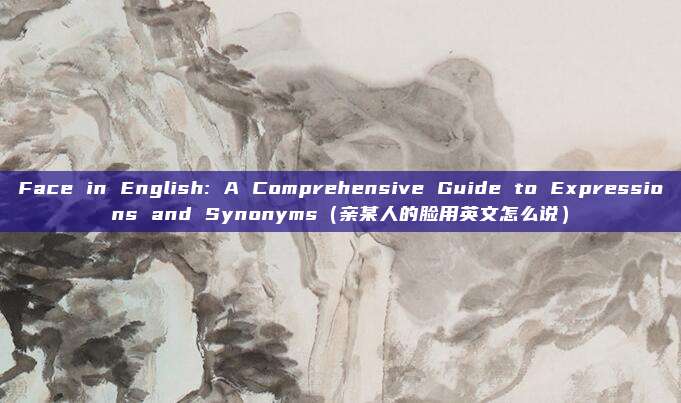Face in English: A Comprehensive Guide to Expressions and Synonyms(亲某人的脸用英文怎么说)
温馨提示:这篇文章已超过223天没有更新,请注意相关的内容是否还可用!
Introduction
In the realm of language, certain words carry cultural significance and are deeply rooted in our daily communication. One such word is "face," which, while simple, has a myriad of uses and synonyms. Whether you're crafting an English essay, engaging in a conversation, or navigating through social media, understanding how to express "face" in English and its related terms can greatly enhance your vocabulary and communication skills. This article aims to provide a comprehensive guide to the various ways "face" can be expressed in English, including synonyms, idiomatic expressions, and cultural nuances.
The Basic Term: "Face"
The most straightforward way to express "face" in English is simply using the word "face." It can refer to the front part of the head, covering the nose, mouth, and eyes. For example:

- "She has a beautiful face."
- "He made a face when he tasted the medicine."
Synonyms and Related Terms
1、Facial: This term often refers to the face itself or its features.
- "She has a delicate facial structure."
- "His facial expression showed his surprise."
2、Countenance: This word is more formal and can refer to someone's face or appearance, often in the context of one's expression or mood.
- "His countenance was one of sadness."
- "She greeted me with a cheerful countenance."
3、Visage: Similar to "countenance," "visage" is often used in literary or poetic contexts.
- "The ancient sculpture had a mysterious visage."
- "She had a captivating visage."
4、Mug: Informal and often used in a playful manner, "mug" refers to someone's face.
- "He has a funny mug."
- "She took a photo of my mug."
5、Visage: As mentioned earlier, "visage" is a formal and poetic term for someone's face.
- "Her visage was striking and memorable."
Idiomatic Expressions
English is full of idiomatic expressions that use the word "face" or its synonyms. Here are a few examples:
Put on a brave face: To show courage or composure in the face of danger or adversity.
- "He had to put on a brave face when he heard the bad news."
Save face: To avoid embarrassment or maintain dignity.
- "She was able to save face by denying any responsibility."
Keep a straight face: To maintain a serious expression despite a desire to laugh or smile.
- "I tried to keep a straight face when he told the joke, but I failed."
Cultural Nuances
In different cultures, the concept of "face" can carry different connotations. In many Asian cultures, for example, losing face (面子) is a significant social issue, where one's reputation and dignity are at stake. Understanding these cultural nuances can help avoid misunderstandings in cross-cultural communication.
Conclusion
Understanding how to express "face" in English, along with its synonyms and idiomatic expressions, can greatly enrich your language skills. Whether you're writing an essay, engaging in a conversation, or navigating social media, these terms can help you convey your message more effectively. Remember, language is not just about the words we use; it's also about the context and the emotions behind them. By mastering the various ways to express "face," you'll be well on your way to becoming a more skilled and nuanced communicator.
网站文章、图片来源于网络,以不营利的目的分享经验知识,版权归原作者所有。如有侵权请联系删除!





还没有评论,来说两句吧...